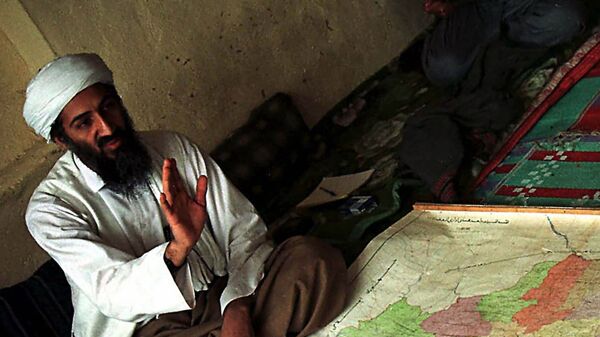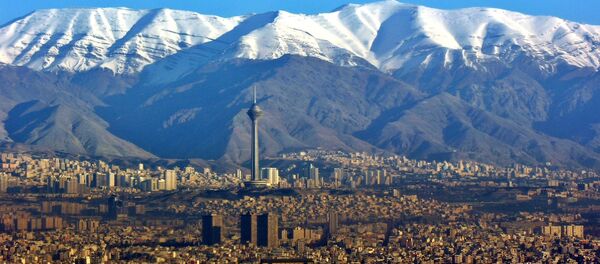On November 1, the US Central Intelligence Agency (CIA) published almost 470,000 files allegedly derived from Osama bin Laden's digital library, taken from his compound in Abbottabad, Pakistan when US Seal Team Six killed the al-Qaeda leader.
Many mainstream media outlets fixated on the link between Iran and al-Qaeda ostensibly established in the documents — their source was the Long War Journal (LWJ), the online magazine of neoconservative think tank Foundation for the Defense of Democracies (FDD).
BREAKING: The @CIA has finally released the documents captured from bin Laden’s Abbottabad compound. Our initial analysis: [thread]
— Long War Journal (@LongWarJournal) November 1, 2017
In particular, the documents described how Iran had supposedly offered "Saudi brothers" in al-Qaeda "everything they needed," including financial backing, weapons and training at Hezbollah camps in Lebanon, in exchange for striking US interests in Saudi Arabia and the Gulf.
LWJ article authors Thomas Joscelyn and Bill Roggio themselves acknowledged in the piece, "it will take years for experts and researchers to comb through this treasure trove of information," yet their piece was posted almost simultaneously with the vast document dump.
#OBLdocs prove OBL managed al-Qaeda’s global network until his death. Also show #Iran facilitated AQ at times. Longstanding LWJ assessments.
— Long War Journal (@LongWarJournal) November 1, 2017
The pair admit they were given a helping hand, however — the CIA kindly provided LWJ with an "advance copy of many of the files."
Regime Change
The FDD strenuously opposed Obama's 2015 nuclear deal with Tehran, openly advocates "regime change" in the country and has close ties to many key figures in Donald Trump's administration.
An October 19 FDD gathering was attended by US National Security advisor HR McMaster and CIA Director Mike Pompeo. McMaster kickstarted the meeting by declaring "I love FDD."
Pompeo was also given a "hero's welcome" by Juan Zarate, FDD chair, who he said he was a "fan" of the Director, and indeed "[loved] the man."
Zarate went on to ask Pompeo to discuss the "Iranian-al-Qaeda link," to which Pompeo replied the connection was "an open secret" — "there have been relationships, there are connections."
"Iranians have worked alongside al-Qaeda. The CIA is going to release, here, in the next handful of days, a series of documents related to the Abbottabad raids that may prove interesting to those who are looking to take at this issue take a look at this issue a little bit further," Pompeo said.
FYI: During his recent FDD speech, Pompeo was asked about "Iranian-Al Qaeda" links and announced the Abbottabad release would occur. pic.twitter.com/FAFKpomVCC
— Ankit Panda (@nktpnd) November 2, 2017
The authenticity of the apparent smoking gun document has been vehemently denied by Tehran.
LWJ's article even noted instances of antagonism between the Islamic Republic and al-Qaeda, at one point stating there has been much "hostility" between the two, such as when al-Qaeda wrote to Iranian leader, Ayatollah Khamenei, demanding the release of family members held in Iranian custody, on pain of suicide bombing attacks.
Nonetheless, such claims have abounded about other countries previously — in particular Iraq prior to the 2003 US-led invasion of the country, and Libya in the lead-up to NATO's toppling of the leader Muammar Gaddafi in 2011.
Both claims have been comprehensively disproven in the years since.
Echoes of the Past
This echo has been noted by former CIA officer Edward Price in a protracted tweet thread.
In it, Price questioned the authenticity of the documents, and suggested Pompeo was employing "the Bush administration's playbook — emphasize terrorist ties as a rationale for regime change."
In Jan, DNI, which led the declassification effort, released what it said was the final tranche of Bin Laden files. https://t.co/FICtIdmVHF pic.twitter.com/4EbWhYpBEN
— Ned Price (@nedprice) November 1, 2017
But a funny thing happened when CIA Director Pompeo came into office. I’m told he re-launched a review of the files.
— Ned Price (@nedprice) November 1, 2017
How can we be sure this was a CIA effort? Unlike previous releases, today’s files are hosted on https://t.co/dk2eM2w02r, not the DNI site. pic.twitter.com/ADkWPFBJ9P
— Ned Price (@nedprice) November 1, 2017
He also noted the November document dump was hosted on the CIA's website, not the Director of National Intelligence's (DNI), as with previous releases — and moreover, the DNI's January bulk release was said to be the last by the agency at the time.
"Why would he [Pompeo] do that? It seems he's convinced the unreleased files would tie al-Qa'ida to Iran," Pompeo tweeted, adding: "What's not as transparent are the motives of Pompeo, the administration's leading and most influential Iran hawk."
"But these moves suggest he's reverting to the Bush administration's playbook: Emphasize terrorist ties as a rationale for regime change," he added.
History doesn’t repeat itself but it does rhyme. Need to remain vigilant to ensure Pompeo isn’t able to write it. <END>
— Ned Price (@nedprice) 1 November 2017
What was entirely absent from bin Laden's files were indications of Pakistani and Saudi aid given to the deceased al-Qaeda ringleader while he hid in Abbottabad.
As investigative journalist Seymour Hersh noted in May 2015, both countries had a huge vested interest in concealing the succour they offered bin Laden in the years following the 9/11 attacks.
"The Saudis didn't want bin Laden's presence revealed because he was a Saudi, so they told the Pakistanis to keep him out of the picture. The Saudis feared if [the US] knew [they] would pressure the Pakistanis to let bin Laden start talking about what the Saudis had been doing with Al Qaeda. The Pakistanis were concerned the Saudis might spill the beans about their control of bin Laden. The fear was if the US found out about bin Laden, all hell would break out," Hersh wrote.
Hersh's account also suggested the trove of documents recovered from the compound were fabricated, quoting a retired intelligence official who called them "a great hoax — like the Piltdown man."




